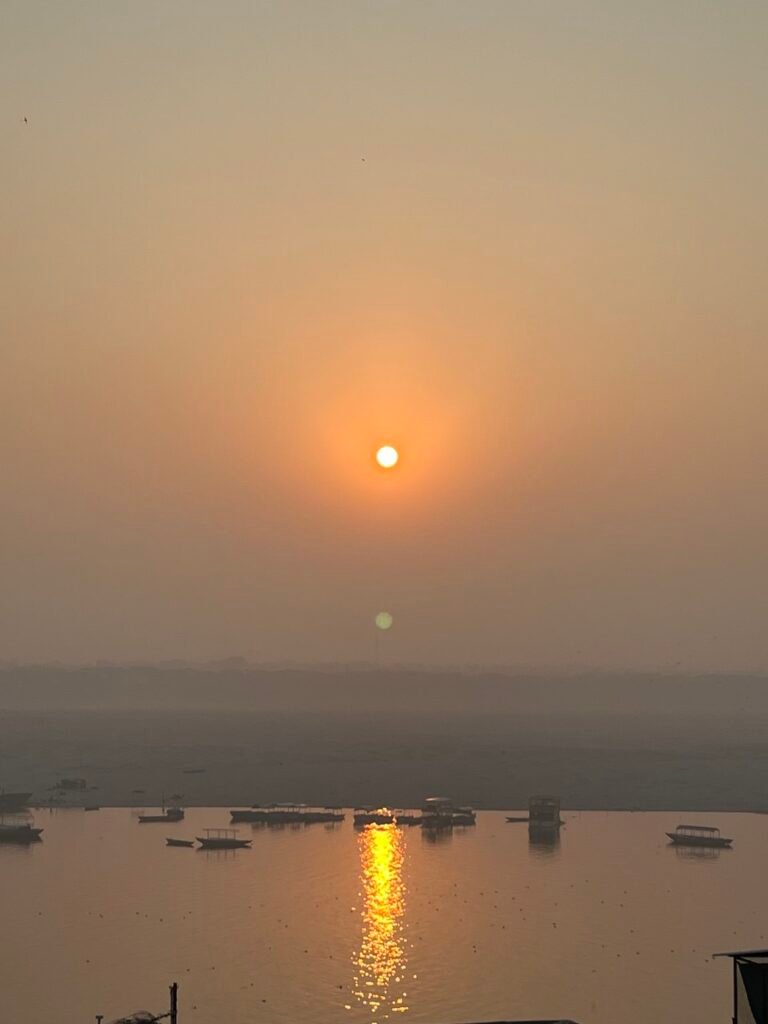Discover more from Varanasi:
👉 Where the Fires Burn – First Encounters with Varanasi reveals the first touchpoints with India’s most mystical city.
👉 Between Life and Flame – Tales from the Ganges continues the journey with intimate insights into the river and its eternal rituals.
Myth of Saturn: Karma, Time, and Transformation
In just three days in Varanasi, the density of events was so intense that it felt like a week’s worth of experiences compressed into a single journey. That same endless day, after visiting the Aghori, we attended a performance by Mykola—The Majesty of Saturn, based on the work by Robert Svoboda, a renowned American Ayurvedic doctor and writer. Rooted in ancient Indian mythology, this text delves into the symbolism of the planet Saturn—as an embodiment of time, karma, loss, and inner maturation. It’s more than just a story; it’s a therapeutic myth that aids in reconciling with the inevitable and finding profound meaning in hardships.
The text, devoid of straightforwardness, functions as an allegory, a mirror reflecting inner fears and hidden desires. It doesn’t entertain but gradually unfolds a sense of destiny before the viewer—as if you had always known everything it speaks of but hadn’t dared face it.
A Rooftop Performance Under the Stars of Varanasi
Everything would have been perfect if not for my overwhelming exhaustion. The performance took place on the abandoned rooftop of an ashram near the Ganges. The cement floor was quickly swept, and dusty blankets or mats were laid out for us to sit on. Under Varanasi’s starry sky, a fire was lit. For two long hours, Mykola skilfully and poignantly narrated the story, unraveling the tragic threads of the tale. It was a monologue spanning the protagonist’s entire life.
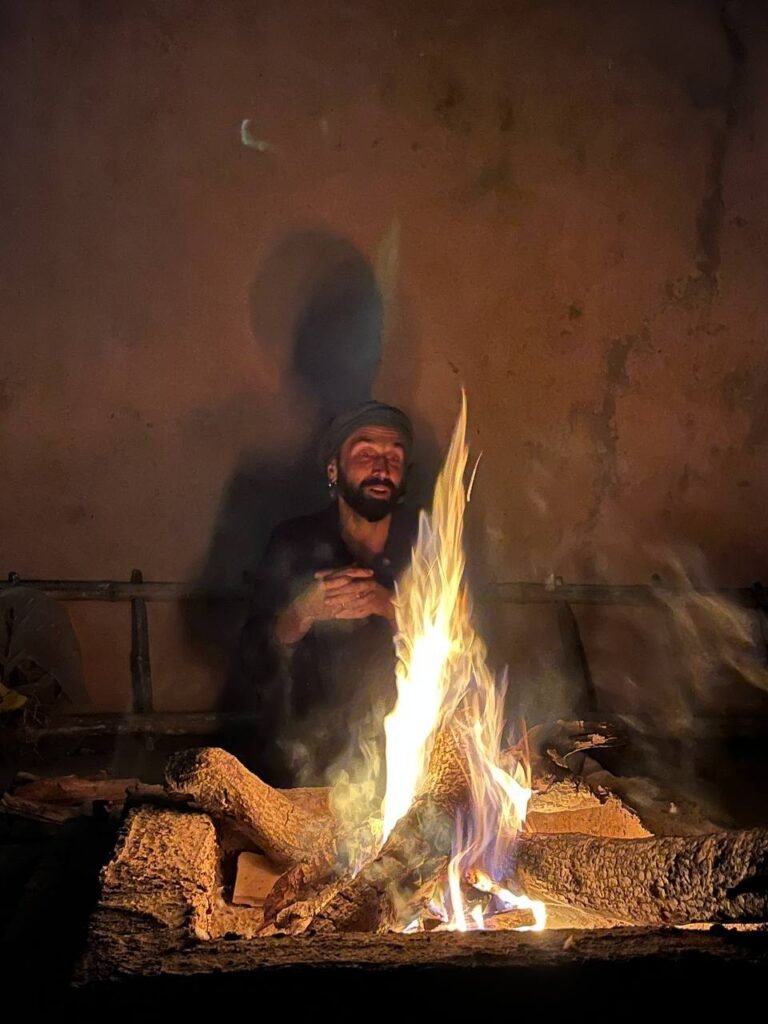
However, the fatigue and back pain became unbearable—I was struggling to sit on the hard, dusty cement floor. Then, like a breath of fresh air, Kirill came to my rescue. I was deeply grateful for such a simple, thoughtful gesture. You, my kindred spirit, understood that lying down beside me wouldn’t be appropriate and that I’d rather endure the discomfort than make a scene. So instead, you gently offered your shoulder. My body finally relaxed, and I drifted off to the sound of the story. I’d love to hear Mykola’s fantastic narration again someday, hopefully in more comfortable surroundings.
A Morning Like No Other: Aarti on the Ganges
The next morning, we had planned a boat ride at dawn to witness the traditional blessing of the Ganges—the morning Aarti. At 4:40 AM, Kirill and I were supposed to meet in the hotel lobby. However, my unpredictable friend decided to stay in, as I learned from a last-minute message.
Unsurprisingly, I stepped into Varanasi’s dusty and cold morning. During this time of year, temperature fluctuations can be at least 10 degrees. It was dark and cold, and the air remained heavy and filled with smoke. I had already stopped chasing the elusive clean air in Asia. Realization and acceptance come gradually.
After about 20 minutes of brisk walking through winding alleys devoid of urban logic, I reached our friend’s hotel. Nastya, Svetlana, and the reappeared Annapurna were ready for the morning river excursion. Mykola found a boat, and we boarded. The city was preparing for the morning ceremony.
The Chill of Varanasi’s Sacred Morning Air
We slowly drifted away from the shore. Fog, mixed with smoke and morning haze, rose above the ghats. The city breathed damply and muffledly. Everything around resembled a dream on the verge of awakening.
People were already gathering on the steps of the ghats, and lights of lamps glided along the shore—the Aarti ceremony had begun. Brahmins in orange robes moved synchronously in the rhythm of the ritual, raising flaming bowls upward, sideways, toward the water. All this was accompanied by the ringing of bells, rhythmic chants, and the pulsation of drums.
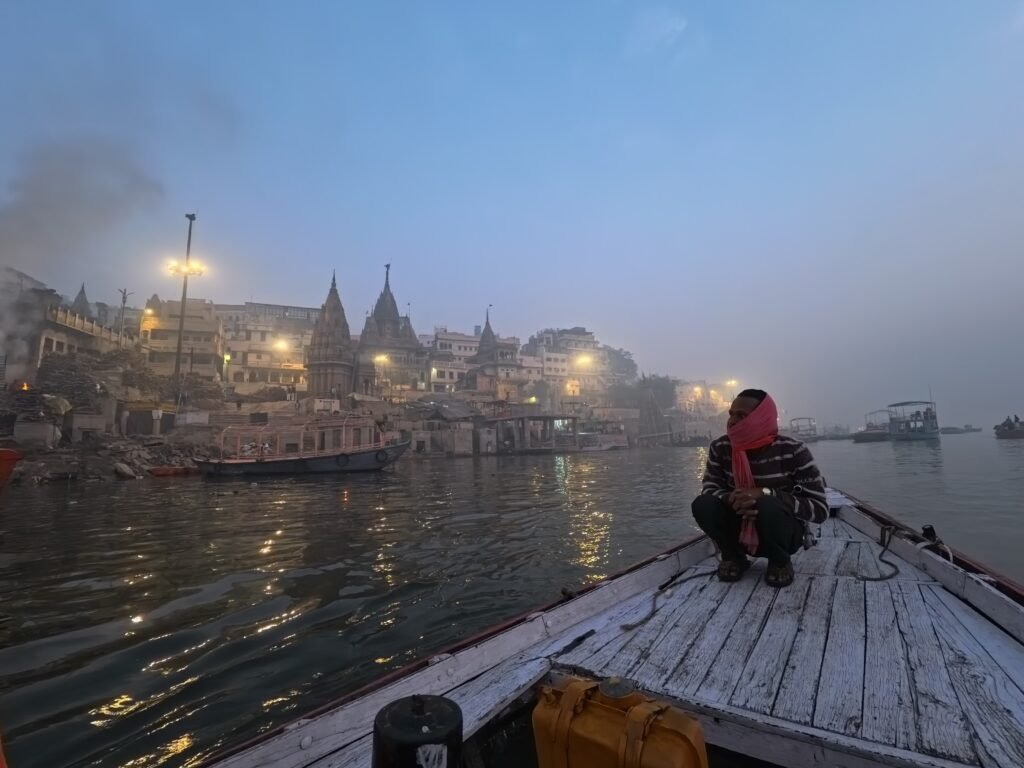
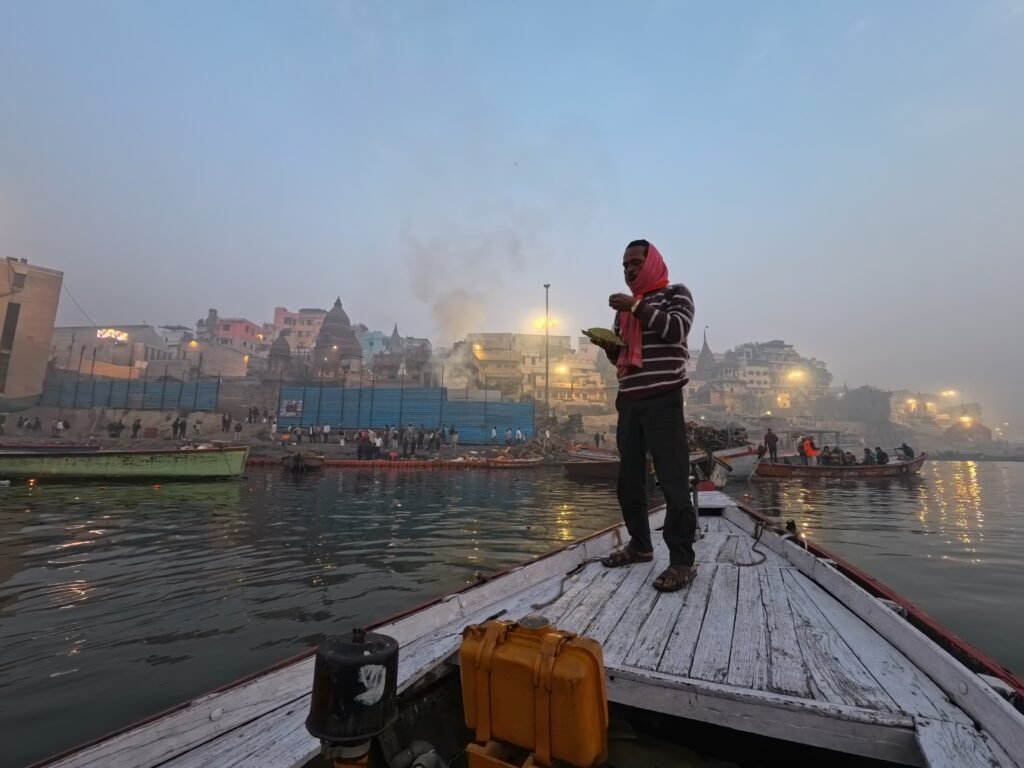
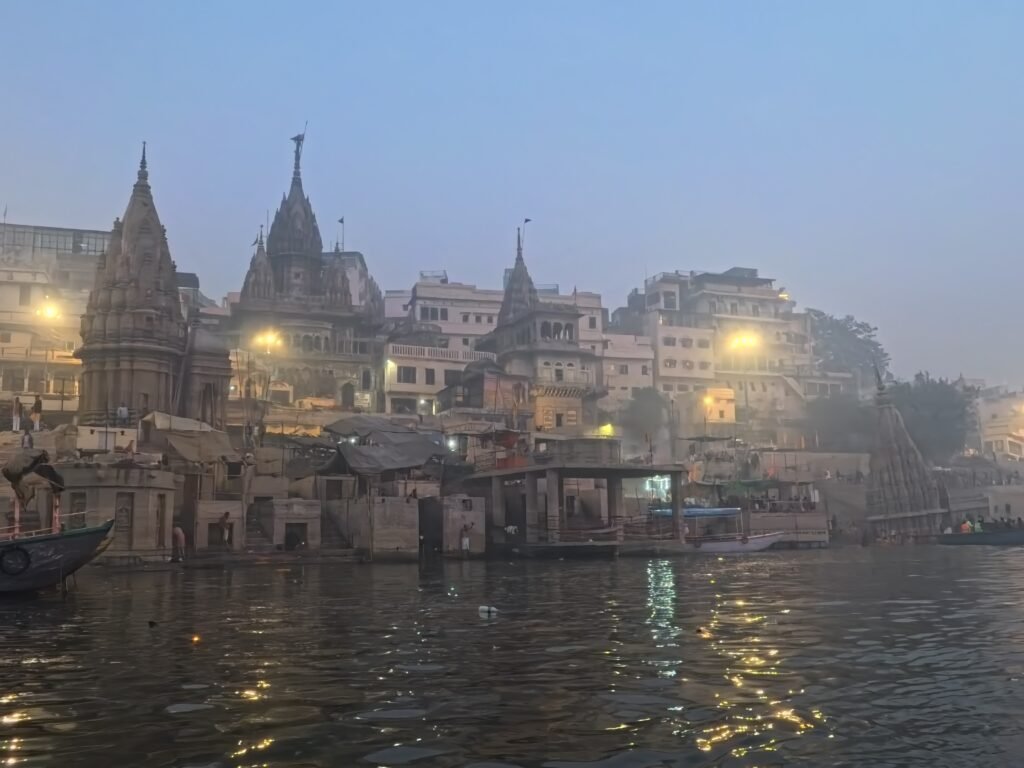
The morning Aarti is a daily hymn to the living river, the goddess, and the mother, who initiates a new cycle each time.
I remained silent. We all remained silent. I was very cold. The damp wind from the river penetrated under the scanty clothing, seemingly seeking out vulnerable patches of skin. The moist air, saturated with smoke, ash, and something else indescribable, spared no lungs. This was the very morning Varanasi—unfiltered, unadorned, authentic. The air hung like a damp cloth, and all the karma that lived here seemed to tremble within it.
It seemed everyone felt the moment’s significance—without words, without comments, just through presence. I looked at my companions: frozen faces and slightly sleepy eyes, yet with a bright focus. Everything was challenging for me. After an eventful day, the evening performance, and an all-too-short night, this boat ride felt almost like a feat. I internally resisted—the cold, the dampness, the heavy air.
Breakfast and Warmth: Reconnecting Body and Soul
But everything eventually ends, and after the exhausting boat ride on the Ganges, we headed for breakfast at a traditional spot where generations of one family have been preparing what is said to be the best idli in Varanasi.
Idli are delicate, cloud-like steamed cakes made from fermented rice and lentils. Their taste is complex to describe: not bright, not rich, but incredibly comforting. They are served hot with coconut chutney and spicy sambar, a thick soup based on legumes and spices.
After a damp morning filled with ashen air and bodily tension, the hot idli spread warmth through the insides.

It was a simple morning—with a cold river, strange silence, and hot idli. And in this simplicity, I suddenly felt lighter, as if body and mind had found each other again.
The sun gradually reclaimed space from the departing cold morning, and the picture came alive again. It was getting warmer. The streets were filling with people. It was Sunday—our last day in Varanasi. We had to sort out flight and travel arrangements to Puttaparthi—the final destination of our shared journey.
Farewell Concert
On that last day in Varanasi, a pleasant prospect of social life finally emerged for me—a classical Indian music concert. This idea warmed my soul so much that I showed uncharacteristic persistence, entrusting Mykola with the organizational part of the event. Information about the concert changed multiple times, which no longer evoked excessive emotions in me.
Internally, I comically shrugged, mentally repeating the now-common phrase—This is India. Eventually, the time and place were determined, and it was agreed that the concert would be held exclusively for us if we gathered at least ten people. Mykola, as always, was up to the task, and the pleasant prospect of an evening concert began to take shape.
I persistently asked Kirill to attend the event, as if knowing in advance that the concert would be truly exceptional.
After some time, our rested friend, who had resolved several issues, materialized, and I sincerely envied him internally—for he could have spent the morning differently. But what’s done is done, and the morning was productive.
Scents That Stay: Sandalwood, Masala & Memory
Having settled travel matters, Mykola, Kirill, and I headed to local shops—or rather, I dragged the guys into a store with oils and spices. Varanasi has countless places, but this one was truly worth it. After thoroughly questioning the shop owner, a pleasant-looking young man, about his business, fiancée, and other details, we sat on the offered stools to explore the aromas.
As is customary in India, the shop owner has been creating various oils and spices, and, according to him, the best masala in Varanasi for generations. I must say, the masala was indeed excellent. I haven’t encountered anything like it since. It warmed and filled tea and coffee with aroma, accompanying me through India up to the state of Kerala, which I’ll detail later.
Sandalwood and Queen of the Night
The shop owner enveloped us in the scents of sandalwood and other wonderful exotic fragrances. An hour flew by unnoticed. Everyone chose something close to their heart. Sandalwood oil still accompanies me. It’s said to balance the mind and aid meditation excellently.
I cannot confirm the calming power of sandalwood—my mind, even after completing a three-week course of yoga, philosophy, and meditation in Rishikesh, still needs training. The oil does not quiet it with a magic wand, though it does caress the senses with undeniable gentleness.
Along with sandalwood, I brought home the scent of Raat ki Rani—Queen of the Night—a soft fragrance touched with vanilla and something else elusive, almost ungraspable.
Which God Do You Like?” — Encounters in the Market
We stopped by a few more shops afterward, though they lacked the charm of the first. These were geared toward tourists eager to consume any local trinket.
In one of them, however, a shopkeeper made me laugh by instantly asking, “Which god do you like?” And just like that—so simple, so direct—India revealed herself again. With one question, he uncovered the endless faces of the divine in this challenging, dazzling country.
Searching for Sound: An Evening Concert in an Ashram
The time for our concert was drawing near. We wove our way through the labyrinthine alleys of the old city, searching for the venue.
Finally, we stood before the gates of an international music center tucked inside an ashram in the very heart of Varanasi. The space was cozy and, surprisingly, quite modern.
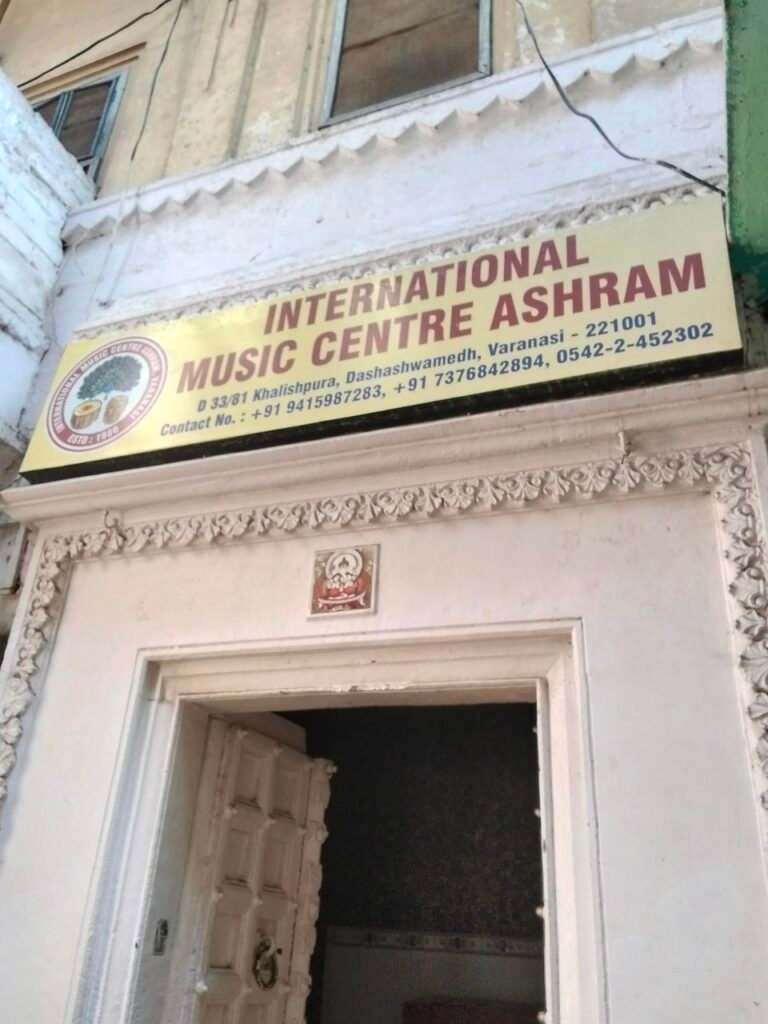
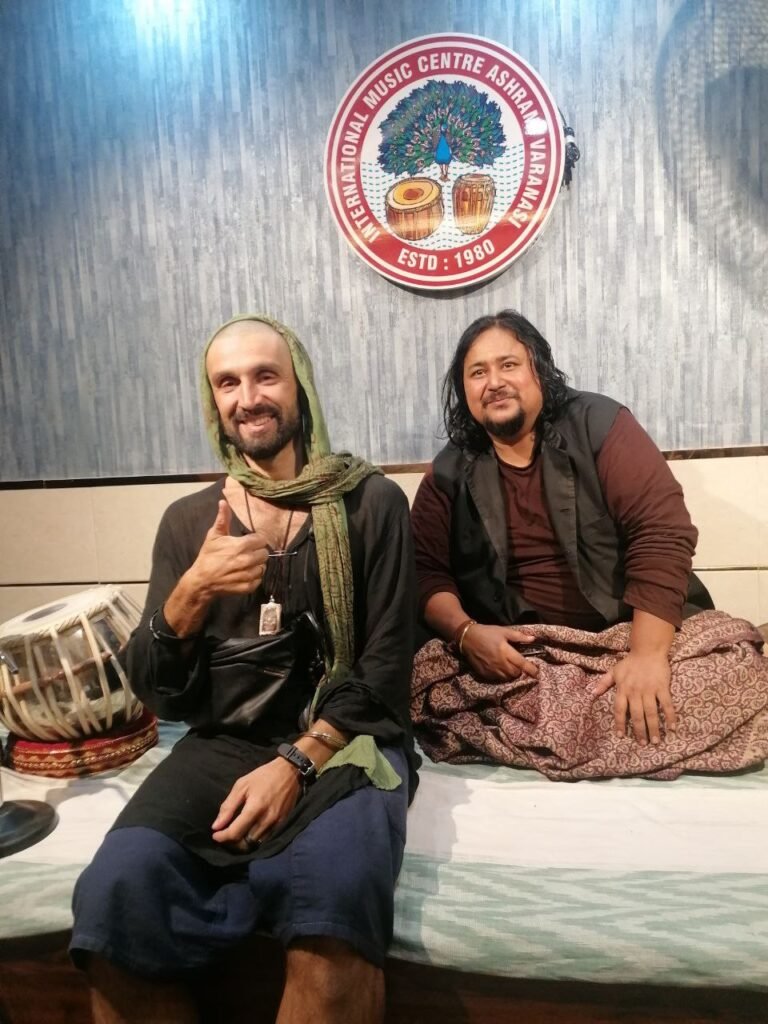
Around a small stage were chairs and cushions for those who preferred the traditional way—sitting cross-legged on the floor. The musicians—just two of them—also sat cross-legged onstage.
It took about forty more minutes for the audience to gather—symbolic time in Indian reality. No one rushed, and no one checked their watch. Everything unfolded as if by itself, in the natural rhythm of this timeless city.
Finally, the musicians—two men in simple clothes—took their places. One settled in front of the tabla, a pair of hand drums with a lively, vibrating voice. The other held a bansuri—a bamboo flute whose sound evokes wandering wind over hills or dreams stirred by Scheherazade’s tales.
The Tabla and the Flute: Letting Go Through Music
The music began almost imperceptibly as if born from the air itself. The tabla set the pulse—complex and multilayered, like India itself. The bansuri wove around the rhythm, telling stories without words of rivers, temples, longing, and love.
The melodies wrapped around us dissolved the inner noise and carried us inward.
The music entered me deeply this time, like warm water—slowly but inevitably. It didn’t demand effort or attention. It enveloped me, seeping through fatigue and tangled thoughts and dissolving everything unnecessary.
I realized I no longer felt my body or time—only sound. Only the vibration of air filled with the tabla’s breath and the flute’s piercing, almost human inflection.
The Man with the Flute
The flutist was especially memorable—a large, full man with a soft, radiant gaze and a warm, almost familiar smile. There was something of the gypsy in him—not in appearance, but in spirit. It was as if he could tell you a story not through words but with a glance, a sound, and a gesture.
After the concert ended, we took a photo together. In it, his hand rests lightly and gently on my shoulder—like that of an old friend you haven’t seen in a thousand years.
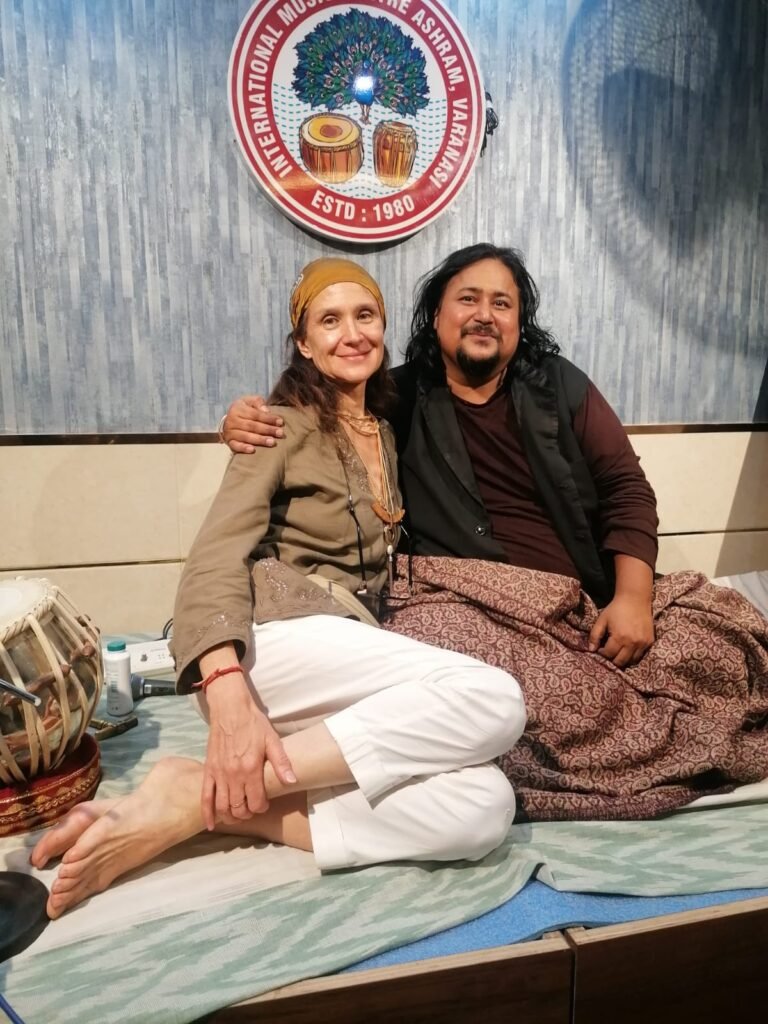
The Silence After Sound
Our entire group was enchanted. The music, the atmosphere, the sincerity of the performance—so many things aligned that evening.
Even the most talkative among us fell silent after the concert as if trying to prolong the fragile magic still hanging in the air.
Later, reflecting on the events of those two weeks, we all agreed: this concert was, without a doubt, one of the brightest jewels in the treasure chest of our journey.
🧳 This article is part of a travel series exploring India. Read the full journey below:
- The Word Was with God – How India Found Me
A personal and spiritual awakening begins in India’s heartland. - Delhi Shock – My First Night in India
Raw impressions from the chaotic, vibrant capital. - The Divine Heart of India – Vrindavan, Krishna, and Rama
A deep dive into sacred cities and mythic lore. - Madness or Faith? A Pilgrimage to Maha Kumbh Mela
Encountering the world’s largest religious gathering. - Exploring Hinduism’s Greatest Festival – Maha Kumbh Mela 2025
A guide and reflection on faith, crowds, and ritual. - To Be or Not to Be: On the Eve of the Great Bathing
Facing existential questions on the threshold of the sacred. - Where the Fires Burn – First Encounters with Varanasi
A visceral arrival in India’s most mystical city. - Between Life and Flame – Tales from the Ganges
Reflections on death, devotion, and the river’s eternal flame. - Journey Through Varanasi – Saturn, Sound, and Spirit
Myths, music, and meaning in India’s spiritual capital. - Puttaparthi: A Dream Made Real
A village transformed by faith: the story of Sathya Sai Baba’s birthplace. - At the Edge of the Universe – A Journey Through Puttaparthi
A cosmic path of devotion, silence, and the soul’s unfolding.

